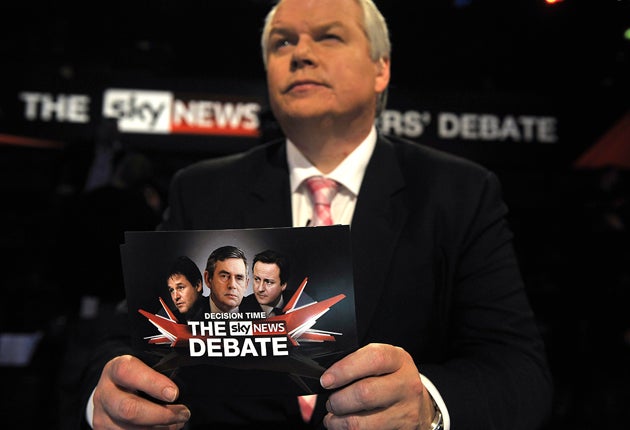Now we've begun TV debates, let's make them even better
Democracy can benefit even more in future elections, says Adam Boulton of Sky News

In the dying minutes of the third and final UK leaders' debate I was moved by something Gordon Brown had to say.
The Labour leader has come under fierce criticism for not connecting to real people and the real world, but he made an observation that will resonate long after 2010's political point-scoring is forgotten. "I want to thank everybody who's been involved in these debates over the last few weeks," he said.
Moments later the cold figures of the "instant reaction polls" fell in on him, but for me it was a timely reminder of the respect we owe to all three party leaders this year for the courage they have shown in seeing through the debates.
It's too presidential, our election is fought in the constituencies, you're reducing it all to the X Factor, and what about the other parties? There are plenty of easy excuses that could have been deployed to duck TV debates. But, in spite of some grumbling, this year Brown and Cameron chose not to deploy them – the first pairing of incumbent prime minister and opposition leader not to do so. More courageously – foolishly many of their supporters would say – neither camp baulked at including Nick Clegg on equal terms. Instead, both manifested a statesman-like acceptance of the realities of multi-party Britain.
Snobs and insiders may carp at the TV debates and some ordinary viewers may profess themselves less than enthralled, but the fact remains that the TV debates have brought election politics to the people in a way never achieved before in this country. Millions tuned in and registered an immediate and unprecedented swing in the polls.
As the novelty wears off there may be a certain sense of "as you were" in terms of expectations for Thursday's outcome, yet more voters and young future voters have been engaged in the debate on the issues as never before.
Late on Thursday night I interviewed Dan Rather, America's anchorman emeritus. Our British debates have been carried in the US on C-Span, the public service cable channel. The American consensus seems to be that our politicians are more weighty debaters than theirs but the consensus on outcome is the same – Cameron first, then Clegg, and then Brown.
Dan Rather startled me by suggesting that my boss, John Ryley, head of Sky News, should be put forward for a knighthood for kicking off the campaign that resulted in the debates. Such sycophancy is way above my pay grade. Once Sky News's initial thrust cut through the Gordian knot of inherited red tape that had prevented debates in the past, the real point was that all the broadcasters – BBC, ITV and Sky – worked together constructively to ensure that they happened this time.
It was fortuitous that rather than a uniform debates commission, each TV company was able to take possession of its own debate and stamp it with its own personality. The rules of engagement were common for all three debates, but audiences were offered variety of the location, theme, moderator and style. At Granada Studios in Manchester, ITV evoked its proud heritage of popular television. In Bristol, Sky News took a brasher, bolder and more focussed approach, building continuous wraparound coverage as only a rolling news channel can. In the great hall of Birmingham University, where Mastermind and Question Time have gone before, the BBC honoured its motto to educate, entertain and inform all under the baton of a national treasure, the hereditary Dimbleby.
Since they were proffering debate virgins, the parties were understandably cautious about what they would agree to this time. All three wanted to restrict the role of the audience and the moderator. Outsiders are dangerous, as Gordon Brown proved yet again in Rochdale last week.
Now the TV companies have proved that they can play fair, I hope that the rules will be relaxed and varied for future election debates. There's no reason, for example, why the BBC shouldn't be able to use its tried and tested programme formula for a Leaders' Question Time. More lively town hall formats could be tested, though having chaired two looser debates in Scotland and Wales this year, I reckon that applause can get in the way of interaction between the debaters.
It would be good if at least one debate included the nationalist leaders and it would be great to see some women on the stage (Kirsty Williams and Cheryl Gillan certainly brightened up the Sky News Wales Debate).
The debates have been an important stage in the evolution of British factual television. They should be a fixture for the future.
Adam Boulton will anchor Decision Time on Sky News HD, Sky channel 517 (501/SD) from 9pm, Thursday
Join our commenting forum
Join thought-provoking conversations, follow other Independent readers and see their replies
Comments
Bookmark popover
Removed from bookmarks